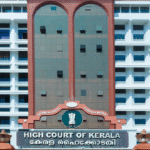Criminal Procedure – Bail – Statutory Bail – Bharatiya Nagarik Suraksha Sanhita, 2023 (BNSS), Section 187(3)(i) – Bharatiya Nyaya Sanhita, 2023 (BNS), Section 310(2) (Dacoity) – Interpretation of “imprisonment for a term of ten years or more” in the context of “imprisonment for life” where no minimum punishment is prescribed.
(2025) 7 KCD 233 : 2025 KER 54411
IN THE HIGH COURT OF KERALA
THE HONOURABLE MR. JUSTICE BECHU KURIAN THOMAS
BAIL APPL. NO. 7686 OF 2025; 23 JULY 2025
The petitioner, Accused No. 2 in Crime No. 389 of 2025 of Kumbala Police Station, Kasargod, sought regular bail under Section 483 of the Bharatiya Nagarik Suraksha Sanhita, 2023. The petitioner was arrested on May 8, 2025, and had been in custody since then.
The offences alleged against the petitioner include Section 310(2) of the Bharatiya Nyaya Sanhita, 2023 (BNS), pertaining to dacoity. The prosecution alleged that on May 6, 2025, the accused wrongfully restrained and abducted the defacto complainant, compelling him to transfer 20,743 US dollars (equivalent to Rs. 18,46,727/-), thereby committing dacoity.
The petitioner contended that he was entitled to statutory bail as sixty days of his remand had expired by July 6, 2025, and the final report had not yet been filed.
The Public Prosecutor argued that dacoity, under Section 310(2) of BNS, is punishable with imprisonment for life or rigorous imprisonment for a term which may extend up to ten years. Therefore, the period available for completing the investigation under Section 187(3)(i) of BNSS is ninety days, not sixty days, and thus the petitioner was not entitled to statutory bail.
The Court noted that Section 187(3) of BNSS permits detention up to ninety days where the investigation relates to an offence punishable with death, imprisonment for life, or imprisonment for a term of ten years or more. For other offences, the period is sixty days.
The Court held that the offence of dacoity under Section 310(2) BNS, punishable with imprisonment for life or rigorous imprisonment for a term extending up to ten years, falls within Section 187(3)(i) of BNSS, enabling detention for a period up to ninety days.
It was observed that offences providing imprisonment for life or imprisonment which may extend up to ten years, even without a prescribed minimum punishment, are categorized as “grave offences”.
Relying on the Supreme Court’s decision in Rakesh Kumar Paul v. State of Assam [(2017) 15 SCC 67], particularly the concurring judgment of Justice Deepak Gupta, the Court clarified that Section 167(2)(a)(i) of the Code (corresponding to Section 187(3)(i) of BNSS) applies to cases where the accused is charged with offences punishable with death and any lower sentence, offences punishable with life imprisonment and any lower sentence, and offences punishable with a minimum sentence of 10 years.
The Court affirmed that if the investigation relates to an offence which provides for punishment of imprisonment for a term of ten years or more, or imprisonment for life, or with death, the Magistrate is entitled to authorize detention up to ninety days.
Based on these precedents and the gravity of the allegations, the Court concluded that the petitioner was not entitled to statutory bail as ninety days had not yet expired.
Result: The bail application was dismissed.
For Petitioner : Advs. K.Mohammed Rafeeq, Bibin Mathew, Vishnumaya Anandan, Sonymon Antony, Shifana M; Abhijith P.A., P.M.Mathew, Amarnath R Lal & Sanaldev E.P.
For Respondents : Adv. Noushad K. A. (Government Pleader)


